Yogesh: The unassuming bard
Since time immemorial, Hindi film songs have been integral to Bollywood folklore and Indian life. While the lasting impact has been due to the effective synergies of the tune, words, and on-screen song picturization, it has been the soothing mighty pen that has permanently stayed with music lovers. The Hindi film song expression has encompassed a wide range of feelings, be it happiness, sorrow, love, brotherhood, parting, reunion, war, or friendship. You can surely find a song for all moments and occasions.
Many songwriters’ stars have emerged, risen, and faded away, but not without sharing their deep thoughts and inferences. Flip through the pages of film song history and you will find each one of them to be a shining example of unbridled flair for songwriting and unlimited gusto for thought articulation.
Take a closer look at the word of successful songwriters like Arzoo Lucknowi, D N Madhok, Kedar Sharma, Shailendra, Sahir Ludhianvi, Shakeel Badayuni, and Majrooh Sultanpuri and you will find multiple ingredients that make their writings special. While Majrooh Sultanpuri could be both versatile and flexible at the same time, Shakil Badayuni was the perfect foil for the tradition-rooted compositions of yesteryear music maestros. While Sahil Ludhianvi’s chaste Urdu always came hitting head on your face, Shailendra’s simple, unassuming Hindi parlance never failed to connect with the lay on the road.
As if to vindicate the age-old idiom “When God closes one door, He opens another”, the same time saw the emergence of a songwriter by the name of Yogesh Gaur. His writings seemed to tread on an identical path to that of Shailendra’s. The similar effortless, unsophisticated Hindi lexis had once again arrived to stay and, as like his predecessor, replete with personal experiences to cannot the complexities of life and futility of human relationships.
Shankar Iyer met Yogesh Gaur at his Mumbai residence to discover more about the bard, his early days, and his long songwriting career.
Tell us about your childhood days. When and how did your interest in films originate?
We lived in Lucknow; my father worked as an engineer at PWD. The employees were offered a leased land where we had built a large house ourselves. Though I loved watching movies, especially Raj Kapoor and Nargis, I never really had any ambition to join films. I had completed Inter level education when my father passed away. We had to rent our house for household income. I tried for a job nearby but was unsuccessful. Our relative Mr. Vrajendra Gaur, who earlier lived with us, was an established dialogue-writer in Hindi films, having written dialogue for many Shakti Samanta movies. I decided to approach him for a job and try my luck in Bombay.
When did you come to Bombay? Please tell me about your early days in Bombay.
I decided to move to Bombay in search of a job. My very close childhood friend Satyaprakash, joined me; we both, thus, left for Bombay, initially staying at Arya Samaj, Girgaum. Starting our search from Grant Road, we finally landed up in a small hut at Parsi Panchayat Road, Andheri. The rent was Rs 12 then.
Initially, working as an assistant to a director was something that I would have liked to do. My friend was very keen that I do something in films only. Though I was not confident of achieving something, I started meeting Vrajendra Gaur’s assistant to know and understand films along with their nuances like script-writing, screenplay, and dialogue. Gradually, I started to put words on paper; very amateur attempts at writing story, screenplay and dialogue ensued.
My daily routine consisted of visiting places like Cooperage ground, Gateway of India, Marine Drive. All for a job! I sometimes landed up at a famous recording studio at Mahalaxmi or one of the 500-600 film producers’ offices there; sometimes bumped into a watchman there, went into one office, only to come out immediately.
How did you take to film song-writing? Share any incident that triggered this talent in you?
It so happened that Vrajendra Gaur got a film ‘Drishti Dosh’ around the ’60s to direct, starring actor Nimmi. A song was required to be written and many writers were keen to try their luck. I wrote something on my own and kept it with the lot to be chosen from. The next day, Mr. Vrajendra Gaur’s assistant came to me saying there was one song in the lot which all had liked. It turned out that the song was written by me! Everybody around was surprised but perhaps, that incident gave me the confidence to write songs for films.
Those were my early songwriting days. However, life was doing enough, the daily struggle, the unfulfilling relationships made me sit and think, only to give rise to more and more thoughts. I started writing regularly, my stock of songs was increasing gradually.
I also met lyricists Anjaan and Gulshan Bawra during the same time. We used to go together to picnics as our friendship developed. I used to share some of my songs with him. Appreciation from him acted as inspiration. I had begun my songwriting journey and got to meet composer Robin Banerjee through one of the friends I had made then.
Do you remember your first interactions with Robin Banerjee?
I had expressed to Robinji my desire to join films and showed him my stock of songs. He would sit daily with his Harmonium composing tunes, went through my songs, and suggested I start writing for him. I started visiting his place regularly; After a few days, I asked him why he did not compose tunes for my words. To which, he asked, “Don’t you write anything?” I was surprised and replied “I have written many of them which you have been reading” He immediately responded saying “Not those, I meant words for the tunes I compose!”. I realiz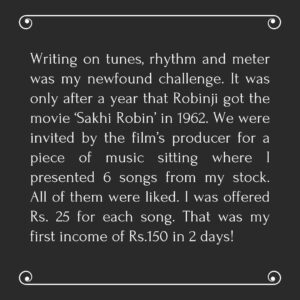 ed then that writing songs for Hindi films essentially meant writing words fortunes and slowly started to develop this skill. Writing on tunes, rhythm and meter was my newfound challenge. This meanwhile, my patient wait was on. It was only after a year that Robinji got the movie ‘Sakhi Robin’ in 1962. We were invited by the film’s producer for a piece of music sitting where I presented 6 songs from my stock. All of them were liked. I was offered Rs.25 for each song. That was my first income of Rs.150 in 2 days!
ed then that writing songs for Hindi films essentially meant writing words fortunes and slowly started to develop this skill. Writing on tunes, rhythm and meter was my newfound challenge. This meanwhile, my patient wait was on. It was only after a year that Robinji got the movie ‘Sakhi Robin’ in 1962. We were invited by the film’s producer for a piece of music sitting where I presented 6 songs from my stock. All of them were liked. I was offered Rs.25 for each song. That was my first income of Rs.150 in 2 days!
How did Sakhi Robin’s songs go with the public? Did you get to write for more films immediately?
The song ‘Tum jo ago toh pyar aa jaaye’ became a hit. It was a first-time experience for me with Manna da and Sumanji singing the song. Robinji got about 8-9 movies, most of them being C-grade ones i.e., with low budgets and lesser-known star cast. I got to write in movies like ‘Rocket Tarzan’63, ‘Marvel Man’64, ‘Flying Circus’65, and G S Kohli’s ‘The Adventures of Robinhood’65. The song ‘Manna mere haseen sanam’ sung by Rafi sahib from ‘The Adventures of Robinhood’ too was a hit.
What are the memories from your first meetings with Salilda? You have done 18 movies with him!
Salilda was an honest composer who never pretended he could compose songs in a jiffy. He worked hard on his tunes. Those days, it was not possible for us to listen to our own released songs. ‘Jukebox’ listening had just started and we used to visit Sabita Chowdhury’s place (who knew Salil Chowdhury then) to listen to our own songs on the jukebox. Robinji knew Sabitaji well and it was through him that I got introduced to her. As time passed by, I developed a good rapport with Sabitaji and requested her to introduce me to Salida. She promised me to do so…though this didn’t materialize for some more time.
I was beginning to find songwriting less and less challenging. The routine song and dance situation did not motivate me enough. To add to this, the great songs of Sahir Sahab, Shailendraji, and Shakeel sahib made me feel like “When will I get to write like this”? I was desperate to go back to Lucknow. That was when I got to meet Salilda. He was a very reserved person. Surrounded by books, was always into reading. At the same time, one of the Calcutta film producers had launched a movie with music by Salilda. The producer did not have anybody of his own to write songs in Bombay. Shailendra, Salilda’s regular songwriter, had passed away then.
I was, hence given the offer to write the songs for the movie. They were liked by Salilda, though the movie finally did not take shape. Another movie titled ‘Mitti Ke Dev’, starring Sanjeev kumar was started by his brother. Its songs had been written by Gulzar and Prem Dhawan. there was one song left and Salilda again asked me if I wished to write songs for this movie. Gathering some confidence, I also expressed my other wish that Lataji sings one of my songs!
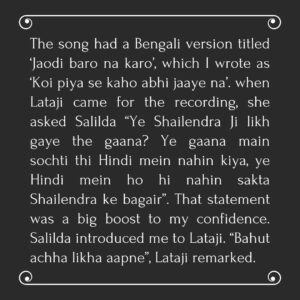 The song had a Bengali version titled ‘Jaodi baro na karo’, which I wrote as ‘Koi piya se kaho abhi jaaye na’. when Lataji came for the recording, she asked Salilda “Ye Shailendra Ji likh gaye the gaana? Ye gaana main sochti thi Hindi mein nahin kiya, ye Hindi mein ho hi nahin sakta Shailendra ke bagair”. That statement was a big boost to my confidence. Salilda introduced me to Lataji. “Bahut achha likha aapne”, Lataji remarked. She even told Producer Padma Trivedi to get all songs written by me. Though ‘Mitti ke Dev’ never really saw the light of day, Padma Trivedi assured me that I would be a lyricist for his next movie.
The song had a Bengali version titled ‘Jaodi baro na karo’, which I wrote as ‘Koi piya se kaho abhi jaaye na’. when Lataji came for the recording, she asked Salilda “Ye Shailendra Ji likh gaye the gaana? Ye gaana main sochti thi Hindi mein nahin kiya, ye Hindi mein ho hi nahin sakta Shailendra ke bagair”. That statement was a big boost to my confidence. Salilda introduced me to Lataji. “Bahut achha likha aapne”, Lataji remarked. She even told Producer Padma Trivedi to get all songs written by me. Though ‘Mitti ke Dev’ never really saw the light of day, Padma Trivedi assured me that I would be a lyricist for his next movie.
Am sure you have a lot more to say about your long association with him.
I think I was with him for almost all movies after Anand’71. There is an interesting story during the making of Anandata’72 songs. I had left Salilda’s house after listening to this long tune of his. The song was to be recorded the next day. As I sat on the bus, I prayed to God that I don’t forget the long ‘mukhda’. And just before I reached home, I had finished writing the words for it! The song was ‘Guzar jaaye din din din. As time passed by, I was finding it easy to fit words to Salilda’s tunes. It was a challenge to write words for shorter tunes of the other composers. As a music composer, Salilda never interfered with my words and style of writing. There was great freedom when I wrote for him. And he was the first to admire my style of songwriting. He would invariably say “you write better than I do!”
Tell us something about ‘Anand’, a landmark movie in your career.
Gulzar was initially the songwriter of the movie. He had finished writing ‘Maine tere liye he saat rang ke sapne chune’. 3 songs of mine were recorded in Mukesh’s voice for another movie produced by Basu Bhattacharya. The songs were ‘Kahin door jab din dhal jaaye, Nain hamaare saanjh sakaare’ and a 3rd song, which I don’t recollect now. Due to a misunderstanding between the filmmakers, this movie never took off. Salilda had the recorded songs and played them in one of the settings for ‘Anand’. Hrishikesh Mukherjee, Rajesh Khanna, and Amitabh Bachchan, all liked the songs. Producer L. B. Laxman immediately bought these songs, however, wanted only one to use in the movie. Thus, ‘Kahin door jab’ made an entry for the evening film situation. ‘Nain hamaare saanjh sakaare’ was used for ‘Annadata’.
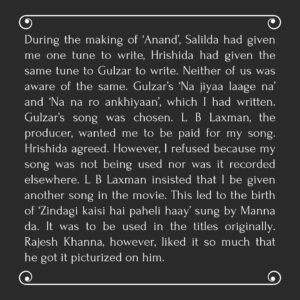 Another interesting incident occurred during the making of ‘Anand’, Salilda had given me one tune to write, Hrishida had given the same tune to Gulzar to write. Neither of us was aware that there were two sets of lyrics being written for the same tune. Both songs were ready to be recorded on the recording day. Gulzar’s ‘Na jiyaa laage na’ and ‘Na na ro ankhiyaan’, which I had written. Gulzar’s song was chosen. L B Laxman, the producer, wanted me to be paid for my song. Hrishida agreed. However, I refused because my song was not being used nor was it recorded elsewhere. L B Laxman insisted that I be given another song in the movie. This led to the birth of ‘Zindagi kaisi hai paheli haay’ sung by Manna da. It was to be used in the titles originally. Rajesh Khanna, however, liked it so much that he got it picturized on him.
Another interesting incident occurred during the making of ‘Anand’, Salilda had given me one tune to write, Hrishida had given the same tune to Gulzar to write. Neither of us was aware that there were two sets of lyrics being written for the same tune. Both songs were ready to be recorded on the recording day. Gulzar’s ‘Na jiyaa laage na’ and ‘Na na ro ankhiyaan’, which I had written. Gulzar’s song was chosen. L B Laxman, the producer, wanted me to be paid for my song. Hrishida agreed. However, I refused because my song was not being used nor was it recorded elsewhere. L B Laxman insisted that I be given another song in the movie. This led to the birth of ‘Zindagi kaisi hai paheli haay’ sung by Manna da. It was to be used in the titles originally. Rajesh Khanna, however, liked it so much that he got it picturized on him.
What was it about Shailendra that Salilda liked?
Salilda himself was a great poet who believed in depth of words. He was impressed by Shailendra’s simple yet philosophical words. Take the example of ‘Main nadiya phir bhi main pyaasi, bhed ye gehra baat zara si’ from ‘Madhumati’58. Another Shailendra song in the same league is from S D Burman’s film ‘Bandini’63 ‘Tu to ankhiyon se jaane dil ki batiyaan, tujhse milna hi zulm bhaya re, jogi jab se tu aaya mere dware’. Shailendra’s ability to say a lot with minimal words was what appealed to Salilda most.
What about the use of pure Hindi in your songs?
Hindi was the language we spoke at home. My mother had studied at Gurukul; she was fond of Hindi poetry which had an early influence on me. When I started to write for Salilda, I realized that his compositions were more suited to the Hindi Geet. There was no place for Urdu Words to increase from then on.
Which writers have influenced you and your style of writing?
Salilda’s Bengali poems definitely inspired me initially. Though I did not know the Bengali Language fully, I used to make an effort to understand the meaning in his writing. Salilda used to narrate awe-inspiring poems from his own and Rabindranath Tagore’s poetry collection. And when I started to write for Hindi films, Salilda acted as constant support. His belief being song-writing for films was more difficult than songs written elsewhere. Of course, Shailendra’s Hindi writings too have been a huge source of inspiration to me.
How did you get to work and associate with the other master S D Burman?
The connection happened through Manna Dey. I had become close to him after the success of ‘Zindagi kaisi hai paheli’ ‘Anand’. I even wrote lyrics for two movies he later composed. Think they were named ‘Sonal’ and ‘Kalankini’, which never got released. Basu Chatterji was making a movie called ‘Us Paar’ in 1974 asked me to choose between Laxmiknt-Pyarelal and S D Burman as a composer. I had respect for both composers; I still called Manna da to get his opinion. He thought I should work with S D Burman, given Dada Burman’s seniority and class. I met Dada Burman after Manna da had spoken to him. “Tu gaana likhta hai? Kya likha tum, sunaao humko” Dada asked me. I was actually mumbling when I said, “Dada, Salil Chowdhury ke sath kaam kiya hai”. To which he said “Achha tum ek kaam karo, hum tumko kaam dega, magar humko nahin achha lagega toh hum tumko nikaal dega. Nikalega toh dil per nahin lagaane ka haan”? ‘Tumne piya diya sab kuchh mujhko’ was the first song recorded for ‘Us Paar’.
Do you have anything to recount about your 2nd and last movie Mili’75 with Burmanda?
I was to write for Hrishida’s ‘Chupke Chupke’ after ‘Us Paar’. However, the movie went to Anand Bakshi because Dada Burman initially believed that I could only write folk songs. Only later when he knew I had also written for Anand and other movies, did he agree for me to write for ‘Mili’.
While recording the first song ‘Badi sooni sooni hai’ for ‘Mili’, Dada got a paralysis attack. He had composed the tunes for all 3 songs of the movie, I had written the words for ‘Badi sooni sooni hai’ and ‘Maine kaha phoolon se’. ‘Aaye tum yaad mujhe’ was written later. As Dada was unavailable for recordings, Panchamda arranged and recorded the songs.
Talking of R D Burman, you have done 10 movies with him. Please share memories with him.
Panchamda was an excellent human being. He had great respect for Salilda. he knew me from the early days when I wrote for Dada Burman. He used to always say “Tu aata nahin hai”. He never refused to work with me, when my name was suggested as a songwriter. I feel it was due to my reserved nature that I did not write more for him. I will have to say he was instrumental in getting me films like ‘Humhare Tumhare’79 and ‘Chala Murari Hero Banane’77.
Once Panchamda called me and requested a recording the next day. Lataji’s dates were booked for the first two songs ‘Teri Katputli hoon’ and ‘Haathon mein haath’ of ‘Chala Murari Hero Banane’. ‘Manzil’ took 5 years to complete. The song ‘Rimjhim gire saavan’ was popular. ‘Jab bhi koi Kangna bole’ from Basuda’s ‘Shaukeen’ was another popular song.
You have also done a few movies with Rajesh Roshan.
I have worked in 3-4 movies with Rajesh Roshan. ‘Koi roko na deewane ko’ Priyatama’77, Na bole Tum Na maine kuch kaha’ and ‘Kahaan tak yeh man ko’ from ‘Baaton baaton mein’79 was popular during those times. Rajesh Roshan was a good composer, he changed his initial style (for example, the long stretch in Julie. I love you) to suit the later song situations.
What about your pairing with Composer Usha Khanna? You have done 9 odd movies with her.
Ushaji was a superb Composer. She was the only composer who could compose a tune in 5 minutes. In many of her compositions, I was asked to write lyrics within 5 minutes after the sitting had commenced! However, the movies were not necessarily good and locked overall media promotion. On the personal front, we shared very close ties. She was very attached to me.
Who are your favorite songwriters? And why?
Shailendra, Sahir Ludhianvi, and Kavi Pradeep. I admired Shailendra, for his ability to express great philosophical concepts in simple words. Sahir sahab’s writings too inspired me a lot, thanks to the hard-hitting style of writing. His exceptional ability to express the truths of life realistically has stayed with me forever. Kavi Pradeep’s patriotic songs are one of a kind. Don’t think anybody else could write the ‘Desh-Bhakti’ songs as well as he could. I shared a special rapport with Neeraj ji. we used to have listening sessions together. He was another poet whose great quality was to convey philosophical truths in straight, simple words.
Which music composers were you most fond of? Are there any reasons?
My 3 favorite composers are Salilda, Madan Mohan, and Roshan. Who can forget the soothing touch of Roshanji in ‘Chitralekha’64? And his magical touch in those evergreen songs from ‘Anokhi Raat’68 like ‘Oh re taal mile nadi ke jal mein’ and ‘Mehlon ka raja mila’. He was truly one of a Kind.
You have also returned from many Tv serials. Which are the more popular ones for people to remember?
Everybody would remember the serial ‘Rajni’ by Basu Chatterjee. Panchamda’s assistant Bhanu Gupta had composed its title music. My other popular serials were ‘Karam Bhoomi’ based on Munshi Premchand’s novel. ‘Chandrakanta’ with music by Usha Khanna had 30 songs and ‘Hasratein’ had 14 songs. The other well-known serials are ‘Teacher’ and ‘Thoda hai Thode ki zarurat hai’.
How is Tv-serial songwriting different from film-song writing?
Title songs in serials need not always be in sync with the storyline. Songs can also form part of all specific episodes. In films, you have to write as per the song situation. On a lighter note, you get a royalty from films, but you don’t get anything from serials (laughs).
What is your message to all music lovers?
My only message to all is to listen to good music. It is like reading a good book to get good thoughts. However, what are good needs to be each individual’s decision and choice!


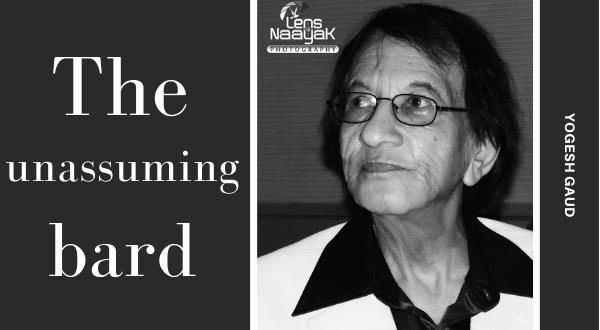
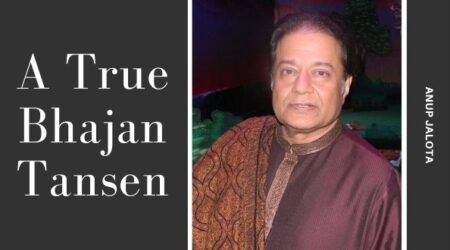
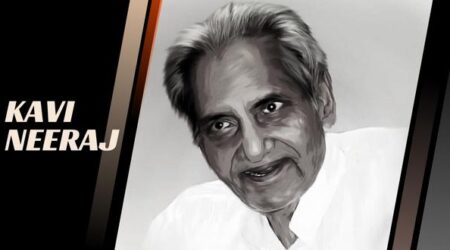
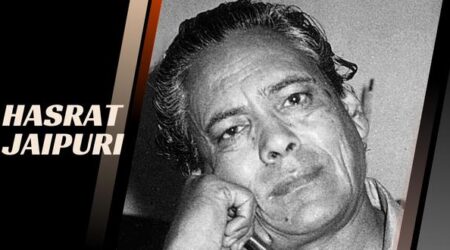
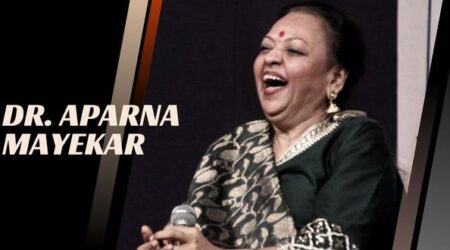
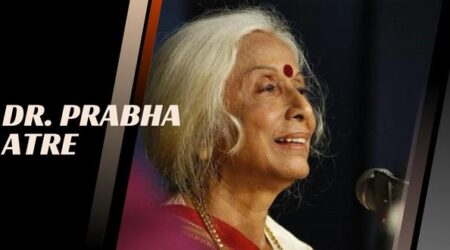
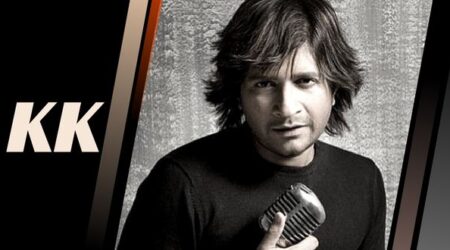
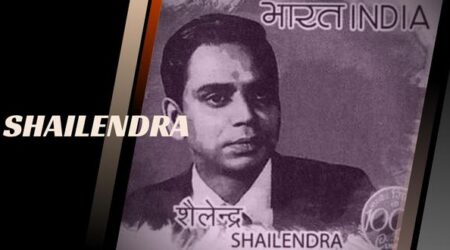
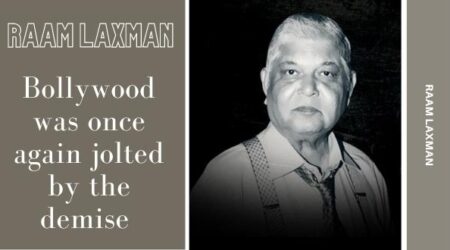
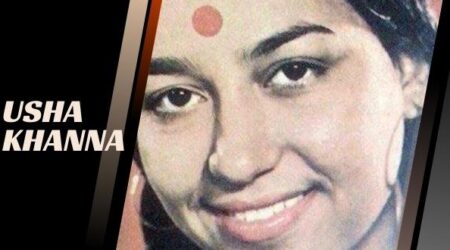
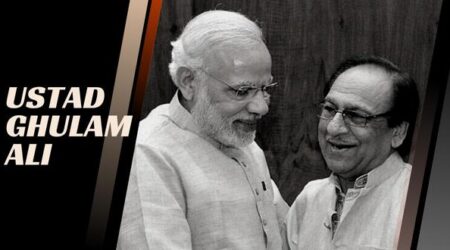

Comment (1)
Namaste. Thanks for remembering one of the most talented and grounded lyricists of Hindi films. Yet I tend to disagree with your use of the term “unsophisticated” for the language chosen by Yogeshji for his beautiful songs. He banked largely upon Hindi-rooted words, as sgainst the Urdu words used by most of his famous and not so famous contemporaries, who were Urdu poets and somehow came to occupy the writing space provided by the Hindi films. Yogeshji stood his ground and used the vast vocabulary of Hindi, which is replete with thousands of soft and musical words. Thus he is one of the true Hindi lyricists of our cinema. The apparent simplicity of his language emnates, in a large measure, from our familiarity with the Hindi words that he so arfully uses in his songs. Most of his words are highly sofisticated, as are all his songs. His language resonates with all of us because it’s grounded in our linguistic traditions. His songs use a format and an idiom which are refreshingly far removed from the oft repeated expressions of the relatively monotonous and exotic Urdu poetry. Warm regards n New Year greetings.